Message of Resilience
Mr Pradeep started his career with Sree Narayana Mission (Singapore) in 2007. In 2009, he returned home to get married. After his marriage, he asked SNM for the opportunity to rejoin the organization; they agreed as his work performance had been excellent.
He is currently a healthcare supervisor and a duty officer who oversees a multi-national healthcare team.
When COVID-19 landed on our shores, he realised that this situation would be tough for the staff who can’t be with their families. Many of his healthcare staff try to be on the phone as much as possible with their families in their free time. Many of them faced the grim prospect of having to choose either their work or their family, but in the end, all of them stayed on as they must support their own families who are far away. This was also in part due to Mr Pradeep’s counsel, informing them that staying safe in Singapore was the best thing they could do for their family.
When COVID-19 landed on our shores, he realised that this situation would be tough for the staff who can’t be with their families. Many of his healthcare staff try to be on the phone as much as possible with their families in their free time. Many of them faced the grim prospect of having to choose either their work or their family, but in the end, all of them stayed on as they must support their own families who are far away. This was also in part due to Mr Pradeep’s counsel, informing them that staying safe in Singapore was the best thing they could do for their family.
Mr Pradeep says that he tries his best to reassure and look out for them and does his best to keep morale up. He works closely with Mr Sajeev, Head of Meranti Home who shares his vision.
Both Mr Pradeep and Mr Sajeev co-operate very frequently, even when Mr Sajeev is working from home, and both aren’t afraid to work hand in hand with the healthcare teams. They do their best to allay the worries that staff have.
Mr Pradeep said that staff are impressed that the organization sticks to their values, and in this time of pandemic, it is where these values truly shine. Staff are well looked after, and SNM helps them to send items back to their home country by absorbing that transportation cost to allow staff to have peace of mind, following Guru’s teachings of compassion.
Mr Pradeep said that staff are impressed that the organization sticks to their values, and in this time of pandemic, it is where these values truly shine. Staff are well looked after, and SNM helps them to send items back to their home country by absorbing that transportation cost to allow staff to have peace of mind, following Guru’s teachings of compassion.
“Morale is high,” he says with a laugh. “We want to raise Meranti home to be the best home in Singapore. Our motto is: We do good, and karma will work out for us.”
Message of Love.
Mr Imesh has been with SNM since 2015. Back in 2017, he received a call informing him that his mother had been in a serious accident and admitted to an emergency ward. He consulted SNM management, who immediately allowed him to go back to Sri Lanka to be by her side, but he was only able to stay there for a month. He shared that he was lucky to be able to do so, as others like his brother, who was working with another organization in Singapore, were not able to go back.
In 2019, Mr Imesh and Ms Subasini had both planned to get married back in Sri Lanka, their home country. Preparations for their big day took longer than expected, and sadly, COVID-19 struck before they could get married, which threw all their plans into disarray.
Ms Subasini said that the mood back then was one of constant heightened tension. The staff in SNM lived in constant fear that they would receive a phone call from home to say something had happened to their families, and the strain that this worry generated wore them down. Knowing that they could not return home in the eventuality of such an event played havoc on their mental health.
“It is in times like this that being there for your family counts for so much” Mr Imesh said, “Sending money home for medical fees is one thing, but that is nothing compared to being able to be there for them.”
This was also of especial importance for Ms Subasini, as she is the youngest child in her family, and grew up in a tightly knit family.
SNMs staff were not allowed to leave the Nursing Home premises due to Phase 2 Restriction orders. His plans and preparations kept being delayed by the pandemic, all the way up to his planned wedding date.
This was when SNMs Sri Lankan staff stepped up together to help Mr Imesh and Ms Subasini. They helped with the preparations for the ceremony and celebration at Sree Narayana Mission Nursing Home and went to great lengths to assist the couple with their needs. It was deeply touching to the couple, and they wanted to share these words: “Thank you SNM for being like a real family, everyone here is like our brothers and sisters.”
This show of solidarity among people is heart-warming to the couple, who, despite having anxiety about this once in a lifetime event, found out that the people around them would unconditionally love, care, and support them when they needed it most. The nobility of the human spirit shines brightest when adversity strikes. Another point of worry for the newly married couple, was that they had invested a large amount in securing a staycation honeymoon before the pandemic. SNM management did their best to allow the couple time to enjoy their staycation honeymoon once Phase 2 restrictions were lifted so they would not have to forfeit their investment.
Mr Imesh and Ms Subasini would like to thank Mr S Devendran, HODs, and HR, who have given their time and advice to accommodate the couple with all their varied needs and for receiving concessions that were aimed to ease their transition to married life. They would also like to thank all their friends in SNM for all the work they put in for their wedding, and for not letting them feel alone despite the pandemic hitting them hard as well. The couple is confident that they can face the challenges of tomorrow, with the support of today.
The Heart and Mind of Daya (Compassion)
Our core values as espoused by Sree Narayana Guru are: Daya (Compassion), Satyam (Trust), Dharma (Righteousness) and Shanti (Peace). Let’s explore what Daya or Compassion means to us. How does ‘Daya’ translate into beliefs, daily actions and behaviours? What has our own personal experience of ‘Daya’ been like as a receiver or giver? How did giving and receiving ‘Daya’ make us feel? In his teachings, Guru emphasized the knowledge of self as essential to his notion of oneness. He claimed that consciousness of the self in relation to others was vital in our understanding of compassion.
Self-examination is essentially a key component in helping us feel empathy for another. If we have never received loving kindness, it would be difficult for us to treat others with loving kindness – not because we do not want to be kind but because we do not know how to be kind. Just as an empty glass will have nothing to offer, one who has been deprived of kindness will struggle to reach out and give.
The way of mindfulness, or the way of awareness, makes it clear that we need to first focus on the self. Self-care and self-examination are important attributes in our understanding of compassion. As opposed to a mindless way of living and doing, we need to bring our full attention to what we are and what we are doing. Modern living, in more ways than one, emphasizes a single minded pursuit for material success, and this pursuit places us in a state where we are inured to everything else, especially the positive virtues of being. It is a state where we have little awareness of the impact of our words and actions on others and on ourselves.
The residents experience the richness and vibrancy of the temple with all their senses through colours, rituals, smells and sounds. Some get to maintain the practices they may have followed when more able-bodied. There are opportunities to interact with other worshippers facilitating a profound social cohesion.
The participating youth volunteers also benefit. They gain insights from the life lessons of elders, realise the richness of the local culture, understand the values of respect and compassion, and learn about eldercare.
Mindfulness is achieved by leaving behind baggage from the past, and emphasizes by focusing on the present, the future will sort itself out. So, how do we bring the fullness of our attention to whatever we are to partake in? We need to bring not only our ‘minds’ but our ‘hearts’ into what we do.
Japanese artist and calligrapher, Kazuaki Tanahashi, describes the Japanese character of mindfulness as consisting of two interactive figures – the ‘Heart’ and the ‘Mind’.
To strike a balance between the ‘Heart’ and the ‘Mind’ is not easy.
Too much of the Heart, and all too often we become lost in sympathy or the sufferings of another. Too much of the Mind, and we are reduced to being cool observers, uninvolved and distant. To be effectively compassionate, we need to strike a balance. We need to cultivate a ‘Quiet Mind’ and an ‘Open Heart’.
What are the qualities of the Quiet Mind? It is Spaciousness and Clarity. It is essentially the source of our capacity for discerning wisdom.
What are the qualities of an Open Heart? It is tenderness, warmth and flow.
How do we attain a quiet mind and an open heart?
We need to be calm to connect with our inner selves and to be fully aware of our divinity. Use your breath as an anchor to help as a focus for your attention, bringing you back when your mind wanders. By bringing awareness to our breathing, we remind ourselves that we are here, and remain fully awake to what is going on in the present moment.
“To use your breathing to nurture mindfulness, simply tune in to the feeling of your breath entering and leaving your body. That’s all. Just feel the breath. Breathe and know that you’re breathing. Do not do it as deep or forced breathing, or going all out in trying to feel something special, or wondering whether you’re doing it right. It’s just the awareness of the breath moving in and the breath moving out.” – Kabat-Zinn
Doing this allows you to attain a meditative silence that will provide clarity that comes from a ‘quiet mind’ and ‘open heart’. Together these attributes allow us to tap deeper into human consciousness and provide clarity of thought. Perhaps compassion in the purest sense is the delicate balancing between a quiet mind and an open heart.
A Socio-Spiritual Community Partnership
Ravi Subramanian
Any community outreach initiative that improves the emotional wellbeing of elderly residents is laudable. And, if it fosters social consciousness and inclusivity, especially amongst the youth, it must be encouraged. And, if it is simple and sustainable, it becomes priceless. It must be supported.
ThOne such initiative is the monthly temple visit, a collaborative effort between Sri Senpaga Vinayagar Temple (SSVT) at Ceylon Road and Sree Narayana Mission (SNM)./p>
These are socio-spiritual visits to the temple, wherein wheel-chair bound elderly residents from SNM are hosted by volunteers from SSVT. The residents, numbering around ten to twelve, perform a circumambulation of the temple, followed by prayers and blessings. Later, the residents enjoy a simple temple cooked vegetarian meal in the company of volunteers.
The residents experience the richness and vibrancy of the temple with all their senses through colours, rituals, smells and sounds. Some get to maintain the practices they may have followed when more able-bodied. There are opportunities to interact with other worshippers facilitating a profound social cohesion.
The participating youth volunteers also benefit. They gain insights from the life lessons of elders, realise the richness of the local culture, understand the values of respect and compassion, and learn about eldercare.
These visits have impacted the residents positively. A brief study that analysed the mood, sleep patterns and the distress levels of the participating residents were encouraging. The feedback from the surveys reflects it. Here’s a sample:
Staff – Whenever they go to the temple, they feel happy emotionally and spiritually. They are excited
to go back. They will ask us when their next visit will be. They really want to go and pray every month.
The program’s success and consistency come from its simplicity. There is little financial investment. Families and professionals find it convenient to participate, as it is held once a month on a Sunday for about 2 hours.
Naturally, this collaborative work was recognises
SSVT won a Special Merit Award for the “Most Creative Community Partnerships” at the Asian Elderly Care Awards, 2019, organised by Managing Elderly Care, Asia’s Premier Learning Conference and Expo for professionals, managers and organisations to Get and Serve Elderly Clients. This coveted award will be presented in March 2020.
In conclusion, a community collaboration of this kind helps to build an inclusive society. It is worth replicating. In this partnership, SNM benefited immensely. SSVT was the reason for its success.
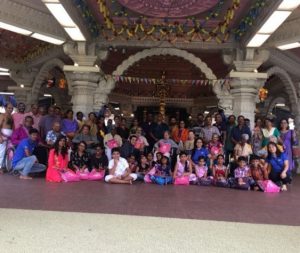
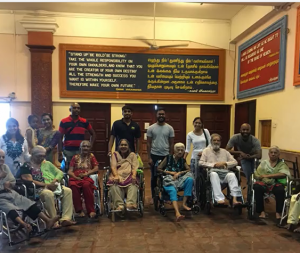
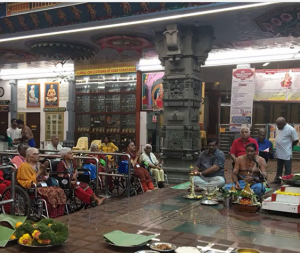
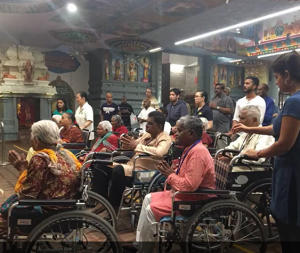
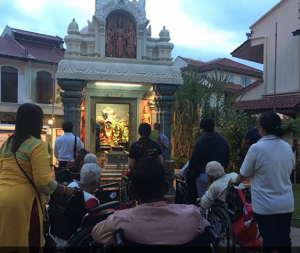
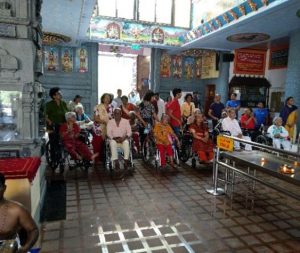
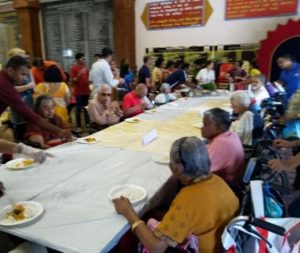
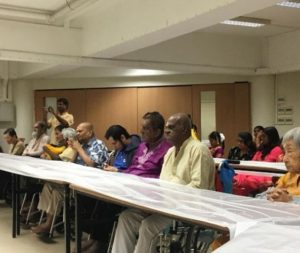
Bonding through Cultural Activities
Sabu
He had spent ten years in Singapore, from 1979 to 1989, without his family but they are now making up for lost time by pursuing their mutual passion together every weekend. Their love for music and dance seems to be the glue that keeps Sabu and his family together.
Already acquainted with Sree Narayana Guru’s philosophy in his homeland, Kerala, Sabu had no hesitation in joining the Sree Narayana Mission’s activities in Singapore when he arrived in 1979. “One of the Guru’s teachings is that we should strengthen through organisation, including cultural activities. Our members love these cultural gatherings – the annual Chathayam celebration is like a festival for members and bonding between the members strengthens during Chathayam, all of them gather then,” he asserts. This is so fulfilling that Sabu says he will continue his work, “Until I die”.
Sabu’s wife, Sheeja, confirms his sentiments, “I am very happy to come to the Mission, I feel good and there is a very good feeling here. We like to do these activities for the members. And doing this together improves the family bonding”.
Sabu has been the Chairman of Sree Narayana Mission’s Cultural Sub-Committee since 2001, unfailingly and diligently holding activities for Chathayam and other important occasions on the Mission’s calendar. Sheeja has been joining him since emigrating to Singapore and their daughter, Priyanka, made her debut on the Mission’s stage in childhood. “I was exposed to all this from young. When my parents were singing, I’d go up on stage and dance – I was three years old then. I started formal dance classes at the Mission when I was eight. This involvement in the Mission has been a part of my life since young.”
She realises that the cultural activities help to further the Mission’s objectives to nurture the self, the community and a communal spirit. “It has shaped me as a person. I knew about my culture earlier than other children. Dance is my passion and through dance I’ve learnt many values – determination, endurance, patience, how to be confident. My father organising all this has taught me much; he spends a lot of time on this and that shows his dedication – I admire that. He does it even though he doesn’t get paid for it. That’s a selfless thing to do. As a family, it helped us spend more time with each other, so we’ve grown as a family. Through this, we also spread our culture; it unites the Malayalees, and with more Malays and Chinese coming for Chathayam, more people know who the Malayalees are,” Priyanka reasons.
The 16 year-old sees herself eventually stepping into her parents’ shoes, “Hopefully, I’ll be like my father and help out. I’m in the Youth Wing and when I’m older, I hope to contribute more to the Mission. I also learnt the Guru’s values – to treat all races as one – and I definitely connect to the Guru in a spiritual way. This involvement helps me to be with my family and their presence means a lot to me. I’m lucky that my family is closely involved in this and would want more families to come together because we are all so busy otherwise. It will help the Mission and themselves – in unity there is strength – when families come together”.
Committed to the ideals of Sree Narayana Guru
R Raveendran
At age 91, few people would have the stamina for any project that requires committed effort and dedication over a sustained period. But Raveendran is of a different ilk from most people. He regularly drives 25 kilometres between his home in West Coast and the Sree Narayana Mission in Yishun to sit through meetings that last from 7 pm to 11 pm.
This octogenarian is an active member of the Sree Narayana Mission and was a member of its Building Fund Committee until 2018. For him, this is just another lap in his lifelong journey of serving Narayana Guru’s vision to uplift communities through education, empowerment and service. “I believe in the Guru’s principles and wanted to do welfare service,” he reasoned.
He had come to Singapore in 1950 from Kerala, India, already steeped in the Guru’s teachings. Thus, he was willing to do his bit in his new home country and propagate the Guru’s drive for community improvement, even though it is a world away from where the Guru had preached. Despite the fact that work and family commitments both weighed on him, Raveendran joined the Sree Narayana Mission in Singapore and took on heavy responsibilities, such as being Secretary of its Executive Committee for a few tenures.
In the early days, he had unstintingly knocked on doors for donations in aid of the Mission’s activities, gratefully accepting whatever little the people could spare then. Over the years, his duties have evolved as the Mission transformed into a larger, more recognised and established organisation. He continues to support as many of the Mission’s initiatives as he can, stepping forward when he deems it necessary, to uphold the Mission’s values and further its aims and objectives.
Raveendran had celebrated his 90th birthday in 2017, but his advancing age is not slowing him down in any way, nor has it dampened his spirit to serve. “The Mission’s members always tell me not to drive so far to our meetings and they always offer to drive me home late at night after a meeting, but I still continue with what I’m doing. I am still able to do all this because of Guru’s grace. Because of the Guru’s teachings, I always want to be doing service for the people. I feel happy to serve. I believe the Guru has a lot of power, and if you sincerely work for the Mission, you will prosper. But you must work sincerely. So I am still fit because of the grace of Guru and I will continue to do this until I die.”
Update: Mr R Raveeendran passed away peacefully on 3/3/2021.
Our Family, Our Service to the Mission
Asokan Raghavan
“Without the Mission, my family would have been different,” Asokan Raghavan declares.
His family’s association with the Sree Narayana Mission spans decades, from the 1950s, when his parents were active members, particularly in cultural events. “Mum was always involved in the Mission, in the singing and drama,” Ambika Raghavan shares. Their father had been a leading member of the Mission’s Cultural Committee. Mohandas Raghavan recalls, “A family outing would be to the Mission. On Sundays, we’d dress up and go there. We looked forward to that, because in those days of ‘kampung’ life, there were not many things to do. Sometimes, we even took a taxi to the Mission. So, it was very thrilling”.
The seven children in their family saw the Mission as their second home and the members as their extended family. “The Mission was very supportive and got the family more settled in Singapore. The members were always coming to our house, singing and recording songs,” Mohandas remembers. Like family, the Mission had been there for them in their time of need, “They financed Mum’s funeral and they also gave me a study loan for my university course in Australia,” Mohandas adds.
The exposure to the Mission during their impressionable years had left an indelible mark on the siblings. Ashokan has taken Sree Narayana Guru’s teachings to heart, “His words like, ‘Gain freedom through knowledge, strength by organisation,’ had a profound impact on me. These have been core values to me. The children of the members who did well in school and life became our role models. Mum never wavered in her beliefs and service to the Mission, so all of us grew up with that belief. Twice a week, from 5.30 to 10 pm, she’d be at rehearsals in the Mission with Dad, and since there were people who felt Mum is doing it for a good cause, they didn’t mind looking after us at home”.
The virtuous cycle of service that the siblings witnessed in the adults around them instilled the same values in their own psyche. Ashokan revealed, “Dad was a storekeeper in the British Ordinance Department and earning a meagre salary of $400 monthly, for all of us. Despite that, what helped us go forward were the values of the Mission. He made sacrifices for the Mission and made do on the meagre salary. It bonded us, to make sacrifices for the good of the organisation. I became a Life Member in January 1972, with the salary I received from National Service upon my promotion to Lance Corporal – I paid $50,” and he has continued serving the Mission. “It was drummed into us, that, no matter how poor, you must share with people – even if you have one slice of bread, share. We went to the Mission’s Home for the Aged and I learnt the value of empathy for people,” Ambika adds. Like Ashokan, she too continues to serve the Mission, even after moving to Perth, Australia, by editing its publications. Mohandas had picked up subtle lessons from the way the Mission was run, “It was important to be clean, studies and education is important. There was food after activities and we learnt to serve food”. He, too, has served the Mission on its Ex-Co and in other capacities.
“All of us are inspired by the Guru’s teachings; the family is united, there is a bonding among us,” says Ashokan. “We never strayed from the Guru’s tenet, ‘One in kind, one in faith, one in God, is man’ and as a family we are united in the same way of thinking,” Ambika explains. Mohandas sums it up, “We are all over the world but we are very close,” attesting to the strong ties that develop when families make the Mission part of their extended home and family.
Looking Back to Move Forward: Reminiscing about the Old Days
Asokan Raghavan
As a child, I have always been associated with the Sree Narayana Mission. There are lots of memories and some from back in the 1950s and 1960s, remain etched in my minds even after all these years. I would like to share some memorable moments and events.
Kadhaprasangam
Kadhaprasangam (lyrical narrative or story telling performance) is a performing art of Kerala, India. It combines speaking, acting and singing while presenting a story. My late mother, Mrs Sarada Raghavan, was a talented artiste and an exponent of Kathaprasangam. During the 1950s there was a sizeable proportion of Malayalees in the Indian community in Singapore. Many of them were migrants from Kerala and a large number of them were living at the Naval Base and Sembawang area. Kadhaprasangam was popular entertainment amongst them and had a large following. During this time, my mother gave at least two performances to raise funds for the building of Sree Narayana Mission. I remember one was held in Pasir Panjang and the other was in Sembawang. Attendance was by purchase of tickets and the events were well supported by the Malayalees.
Chief Minister David Marshall’s visit to the Sree Narayana Mission, mid 1950’s
During the mid-1950s, the then Chief Minister of Singapore, Mr David Marshall was a guest-of- honour for one of the Guru’s birthday celebrations. I accompanied my father to the event and it was held in an open field. A stage was erected at the edge of the field and chairs were placed in rows for the audience to sit. There was a huge crowd present. I remember seeing four men seated on the stage as a forum was in progress. It was dark, about 7.00 p.m. Chief Minister of Singapore, Mr Marshall Minister arrived. He was brought to the stage, garlanded and invited to speak.
Malayalam Drama, 1960
On 3 December 1960, a Malayalam drama, Puthiya Akasam, Puthiya Bhoomi was staged to raise funds for the Sree Narayana Mission. What was significant about this drama was that for the first time since the founding of the Mission, female roles were played by women. Prior to that, men had always portrayed women roles in the plays put up by the Mission. The pioneering female actresses were Mrs Sarada Raghavan, Mrs Vasanthi Pillai, Mrs Philo Augustine and Miss K Ganga Devi Menon. The drama was well received. Attendance was by sales tickets, which were all sold out. The local Malayalam paper gave a rave review of the drama and praised those ladies who participated in the drama
Photo
L to R: Miss K Ganga Devi, Mrs Philo Augustine, Mrs Saradha Raghavan and Mrs Vasanthi Pillai
Flag Day, 1961
In 1961, I was a primary three student at Nee Soon Primary School. The first Flag Day of the Sree Narayana Mission was held in May that year. It was on a Saturday, and in those days Saturday was a school day. However, I did not go to school that day with parental permission. Early morning, my sister and I started the street collection in the Nee Soon area, accompanied by an adult volunteer. There were many other children and adults who participated in the event as well. We carried a tin for the collection of coins and a box hung around our neck containing saffron paper badge with a pin attached to it, bearing the message of the Sree Narayana Guru. It was a tiring day for us, having to walk around, greet people and ask for donations. Some people were very nice but others not so. The officials asked us to stop our collection at about 6.00 p.m. The tins were then taken to the Sree Narayana Mission building for counting by officials and volunteers. The total collection that year was about $8000.
Mr Lee Kuan Yew at the Sree Narayana Mission on 12 September 1965.
I first met the then Prime Minister, Mr Lee Kuan Yew in March 1963 when I was a primary five student. He visited my school, Nee Soon Primary School and I remembered shaking his hand. I was over the moon with excitement.
Mr Lee Kuan Yew, had visited the Sree Narayana Mission on three occasions. His first visit was in 1963 during the General Elections campaign. The other two visits were in 1965 and 1967. These visits were made during the Onam and Chathayam celebrations at the Sree Narayana Mission respectively. Mr Lee’s visit in 1965 went down the annals of the Mission, as this was the first public engagement the Prime Minister attended after Singapore gained independence on 9 August 1965.
The Sree Narayana Mission celebrated Onam and Chathayam from 6 to 12 September in 1965. The packed programmes included prayers, music, dance, drama and a public forum. The latter was held on the last day, a befitting climax to the whole celebrations. I went with my father on that day and witnessed a huge crowd, mostly Indians, waiting for the arrival of the guest-of-honour, Mr Lee Kuan Yew. He arrived at 11am and was led away to meet members of the Sree Narayana Mission’s Executive Committee before proceeding to the Auditorium. The programme started off with a welcome address by Mr K Devadasa Panniker, the General Secretary, and this was followed by a speech by the President of the Sree Narayana Mission, Mr M K Bhasi. Prime Minister Lee addressed the audience in Malay and in English. Though, I was very young then, I admired his oratory skills. He was very articulate and spoke with deep passion. The audience listened with rapt attention and gave him a great applause.
After his speech Mr Lee presented scholarships, valued at $100 to 10 students and left the Mission at about 12.30 pm.
I had been involved in the activities of the Sree Narayana Mission over the years. I became a member in 1972, and served in the Executive Committee from 1978 to 2002. Sree Narayana Guru’s teachings has had a profound impact on my life. His words,
“Gain freedom through education”
“Gain strength through organisation”
“Gain prosperity through industry”
is still relevant to us in Singapore. It is about acquisition of new skills, teamwork and enterprise, all key factors to the progress of our nation.